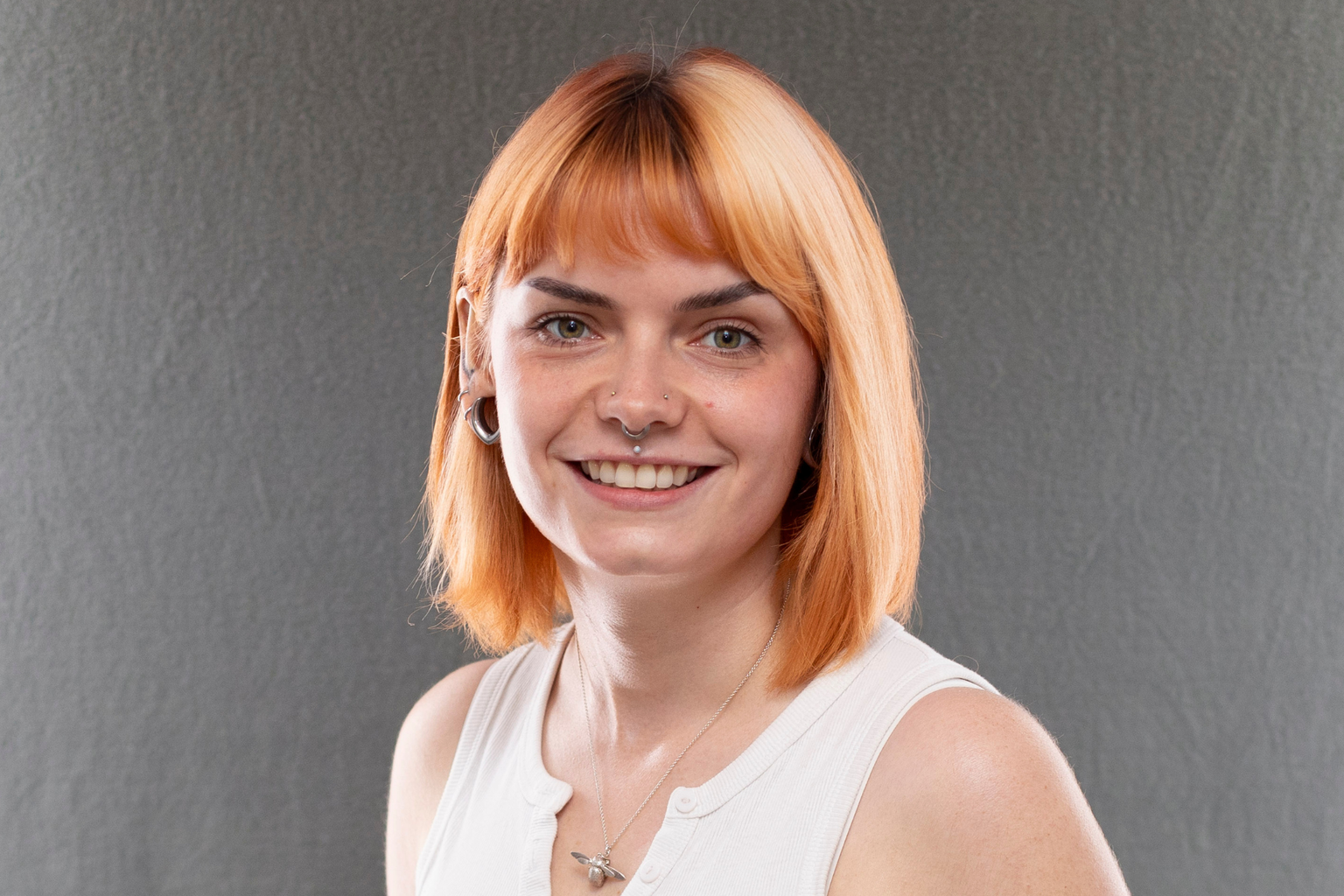News

01 April 2025
Stowers Institute and American Century Investments announce passing of longtime board chairman Richard W. Brown
Brown, who held key leadership roles for both organizations, passed away March 27, 2025.
Read Article
News
A Q&A with LGBTQIA+ Stowers members

Q&A with Steph Nowotarski, Staff Scientist in Electron Microscopy
What inspired you to pursue a career in science?
I really like to know how living things work so we can understand how things go wrong. Specifically, I am absolutely delighted by things outside of our human understanding of scale, and love looking at the very smallest of things under the microscope. I want to know: How do cells move? Who are their neighbors? How are those cells doing work together in a tissue? And, I love the parallel between cells in a tissue doing a function and people in a lab or organization solving a problem.
What does pride mean to you?
Pride is a time to remind myself to show up as my full self whenever it is safe for me to do so. It’s not just for me but for other folks as well - there is safety and power in numbers. The increased visibility this time of year helps us power through times when we are alone, or feel invisible, or need to be invisible for our safety.

Steph Nowotarski, Staff Scientist in Electron Microscopy
Why are you passionate about the science that you work on?
As a staff scientist in light and electron microscopy, my passion is working on solving new and varied problems that folks bring to me. While I love looking at microscopy images and getting samples to yield data, the very best part of science for me is creating something better together than if we all just worked on our own things quietly in a silo. Diverse points of view and expertise lead to more creative science.
What advice would you give to trainees or other early career scientists? (Particularly for those who identify as LGBTQIA+)
Find folks further along than yourself both in their career and in being out that you can interact with often. It’s so very helpful to be able to see a path forward. And, it's integral for getting through tough times, both professionally and personally. It helped me get through grad school and became a real struggle early on in my postdoc. Allies are also really important! But, at the end of the day, when something like the state or country votes and says you can’t get married/have healthcare/dress the way you want to, it’s integral to have LGBTQIA+ family around who know what that feels like.
Why is representation important in the sciences?
Bias is real. Representation is integral in fighting bias. Not just for LGBTQIA+ folks, but for everyone. Every interaction we have with someone different than us makes us not just tolerant, but open and accepting of ways and means that are different than our own experiences. Fighting bias has always been important and is even more so now as AI is digesting the human corpus of knowledge and taking our bias with it. And also: diversity leads to innovation.
Are there any additional experiences/obstacles/lessons that you have encountered in your career (related to identity) that you would find valuable in sharing with others?
I ended up in grad school a bit longer than some of my peers for multiple reasons, but I can clearly see in hindsight that a lot of it was having to spend time focusing on understanding my identity and navigating a new aspect of my personal life in ways that my straight peers didn’t have to. Spending time worrying about coming out to new people is exhausting, especially for young folks who aren’t practiced at it. The mental load of the inner conversation of "Who do I come out to and how?" in just about every casual conversation is always there.
No one likes to think about inherent bias, even folks who are allies and even ourselves, but the literature bears it out. It’s hard to be LGBTQIA+ in STEM: We are less likely to have career resources, have fewer opportunities for advancement, and are less likely to feel comfortable whistleblowing. We are more likely to have experienced devaluation of our professional expertise and social exclusion and more likely to experience sexual harassment at work. For additional information on that topic, learn more at this link.
Q&A with Lindsay Shelton, Application Programmer
What inspired you to pursue your career?
I was inspired to pursue a career in IT because I love solving problems and working with tech has always come naturally to me. This is my second career and I was self-taught, just like my dad did for his second career, so I also like to think I'm following in his footsteps.
What does pride mean to you?
Pride means being unapologetically yourself, and being unafraid to celebrate those things about you that make you different from the mainstream or norm. It's celebrating differences and celebrating love, though for me, it's more love of myself and love of my community than it is romantic love (as I'm aromantic).

Lindsay Shelton, Application Programmer
Why are you passionate about the work that you do?
I'm passionate about helping scientists and those that assist scientists with their technology needs because there are problems to solve and people to help and I'm good at it. This is how I can contribute to the world and to the amazing science that our employees are doing every day.
What advice would you give to trainees or other early career scientists? (Particularly for those who identify as LGBTQIA+)
Find a place to work where you feel comfortable being yourself. If you don't feel comfortable being open about who you are, whether that's your sexuality or just your personality, then life is too short to spend all of that time at a place not being yourself. I did that for 10 years as a teacher. I was never out and never really felt like I fit in. Here at the Stowers Institute, I am proud to be asexual and aromantic, I've felt accepted for who I am, and I'd never go back. I was nervous the first day I wore an Asexual Pride shirt to work here at the Institute, but no one said anything at all, and now I'm far more comfortable here.
Why is representation important in the sciences?
Representation is important everywhere. I can barely name any famous asexual or aromantic people, which is yet another reason why I'm so vocal about who I am, so that someone else who may relate can get some visibility and realize, hey, maybe that's me too. It's through representation that people may find someone whose experiences mirror or relate to theirs. It may help them open up a new world.
News

01 April 2025
Brown, who held key leadership roles for both organizations, passed away March 27, 2025.
Read Article
Press Release

27 March 2025
Alejandro Sánchez Alvarado, Ph.D., receives recognition as a leader and expert in regenerative biology and its potential to transform human health.
Read Article
News

17 March 2025
“The sky is the limit at the Stowers Institute. If you have an idea, there is always somebody willing to help you make it happen.”
Read Article
